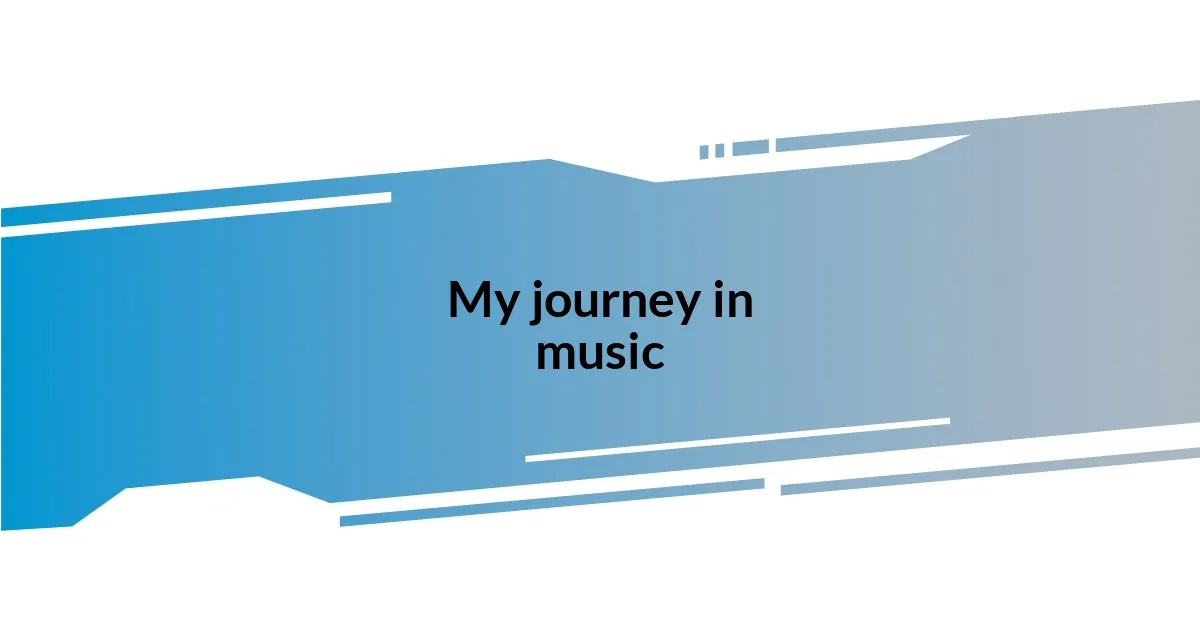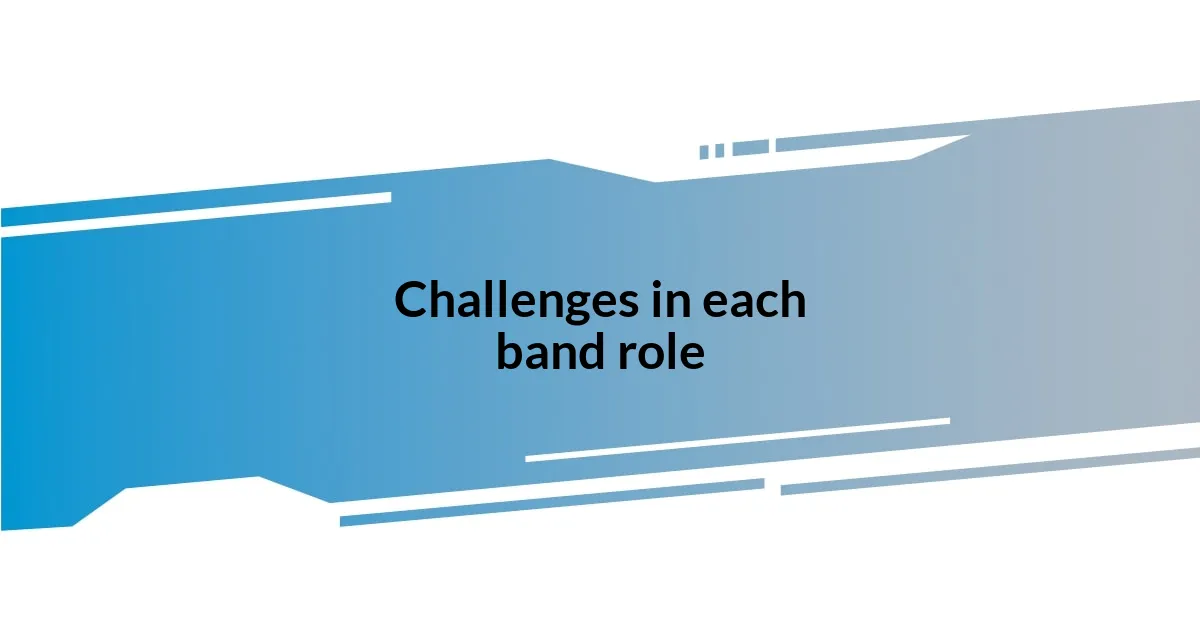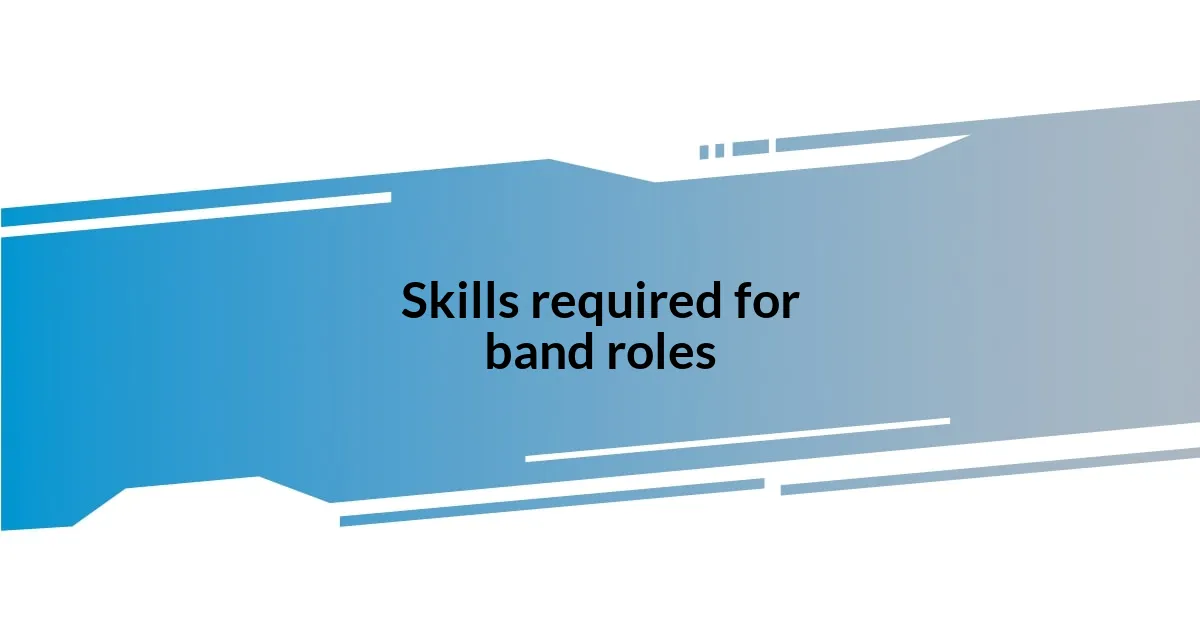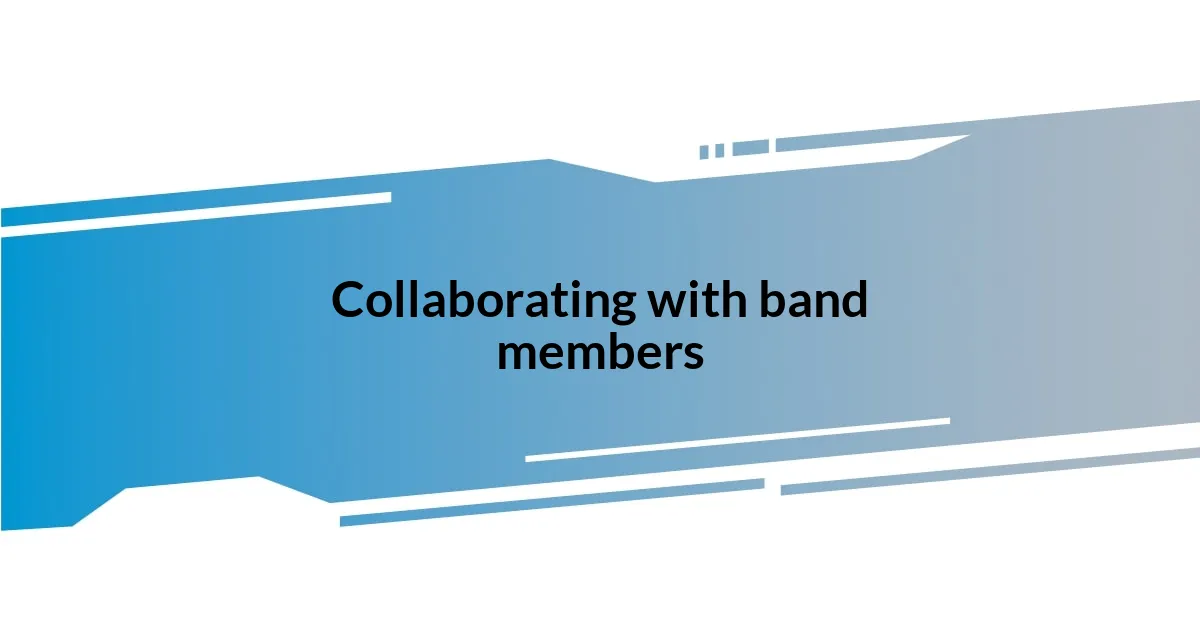Key takeaways:
- Experiencing different band roles enhances musical understanding, fosters collaboration, and builds emotional connections among members.
- Challenges faced in roles, such as songwriting and adapting to other instruments, contribute to personal and collective growth in music.
- Effective communication and trust within the band are crucial for successful collaboration and creativity.

Introduction to band roles
When I first joined a band, I was struck by how each role contributed uniquely to our collective sound. Every position, from the lead vocalist to the drummer, plays an essential part in creating a cohesive musical experience. Have you ever thought about how a single guitar riff can shape an entire song? It’s fascinating to see how each member’s input can ignite creativity and collaboration.
Reflecting on my journey, I remember the daunting yet exciting moments of switching from a guitarist to the bassist. Initially, it felt like trading in my flashy solos for a supportive role, but I soon learned the value in holding down the rhythm. It was a lesson in humility and teamwork that deepened my appreciation for how vital each role is in making the music come alive.
In my experience, understanding band roles transcends just playing an instrument—it’s about building relationships and a shared purpose. Each member brings their own flair and emotional depth, weaving a tapestry of sound that resonates with our audience. Have you ever noticed how a band can transform a crowd’s energy? That magic begins with the distinct roles and the synergy between them.

My journey in music
Looking back on my musical journey, I can’t help but smile at the various roles I’ve embraced. Each has taught me something valuable, like the time I filled in as a drummer for a few gigs. At first, I was terrified; keeping time felt like balancing on a tightrope. But as the rhythm flowed beneath me, I found a new groove and an unexpected joy in supporting my bandmates.
- First experiences shaped my understanding. My early days playing rhythm guitar showed me the importance of a steady backbone in any song.
- Transitioning roles challenged my adaptability. Filling in as a drummer forced me to think differently about music and timing.
- Each role enhanced my collaboration skills. Working with different musicians taught me that communication is key in capturing a song’s essence.
- Emotional connections grew stronger. Jamming in the studio formed bonds that made our music feel more like a shared heartbeat than a collection of notes.

Exploring different band positions
Exploring different band positions has been one of the most rewarding experiences of my musical journey. Each role I’ve occupied has brought its own set of challenges and joys. For instance, as a backing vocalist, I discovered the beauty of harmonization, which is often overlooked. The subtlety of blending my voice with others taught me about dynamics and balance in music—did you know that a well-placed harmony can make a song soar?
When I played keyboard, I was initially overwhelmed by the complexity of arranging chords and melodies. However, that role opened my eyes to the layers of sound that contribute to our music. It felt like painting with colors I had never explored before. I vividly remember the satisfaction of crafting a lush soundscape that pulled the audience into the emotional core of our songs, ultimately highlighting the importance of every instrument working in unison.
Then there was my short stint as a manager, where I grasped a different side of band life. Juggling schedules and booking gigs made me realize how every role, whether on stage or behind the scenes, is interconnected. It taught me invaluable lessons about leadership and support, and reinforced my belief that every contribution—big or small—makes a difference in our collective output.
| Band Position | Key Insights |
|---|---|
| Backing Vocalist | Learned the art of harmonization and the importance of blending voices. |
| Keyboardist | Gained an appreciation for melody layering and the emotional depth it adds. |
| Manager | Understood the significance of organizational roles in making music happen. |

Challenges in each band role
Each band role I’ve taken on has come with its own unique challenges. As a lead guitarist, I often found myself grappling with the pressure to deliver not just technically, but emotionally as well. You might think it’s all about the flashy solos, but honestly, it’s about conveying a feeling. I remember one performance where I completely blanked during a crucial solo and it felt like time stopped. That moment taught me that every note should resonate, not just be played.
Playing bass was another eye-opener. I thought I’d be in my comfort zone, but the bass demands a different kind of attention to detail, especially in tight sync with the drums. Establishing that groove was daunting at first. I’d often find myself feeling lost during practices, like I was trying to navigate through fog without a map. But over time, I realized how vital the bass is in tying everything together—creating that foundation that allows other instruments to shine.
Then there was the challenge of being a songwriter within the band. It’s not just about the words I chose; I felt the weight of translating raw emotion into lyrics that others could connect with. There were days when I would sit alone, staring at a blank page, wondering if my thoughts were worth sharing. But those moments of vulnerability ultimately shaped some of our most powerful songs, teaching me that honesty in music is where the magic happens. Isn’t it fascinating how personal struggles can lead to shared experiences?

Skills required for band roles
When it comes to performing in a band, certain skills are absolutely essential. For instance, effective communication stands out to me as a cornerstone of any successful group dynamic. I remember a rehearsal where we struggled to align our ideas for a new song. It wasn’t until we opened up and expressed our thoughts that everything clicked. Isn’t it amazing how a simple conversation can transform chaos into harmony?
Adaptability is another crucial trait that I found invaluable. In one instance, our drummer fell ill right before a big gig. Stepping in to fill that role, I had to adjust my playing style and mindset on the fly. It was a nerve-wracking experience, but it taught me just how vital it is to be versatile. Being open to change allowed me to see the bigger picture—flexibility can lead to unexpected, beautiful outcomes in music.
Lastly, I can’t stress enough the importance of having a solid work ethic. During the times I took on the role of a backing vocalist, our success relied on consistent practice. I still recall the late nights we spent fine-tuning our harmonies. Those moments taught me dedication, and the realization that hard work often translates into unforgettable performances. Do you think the effort put in backstage is just as vital as what happens in front of the audience? In my experience, it absolutely is.

Collaborating with band members
Collaborating with band members often feels like a dance, where each musician brings their own rhythm and style to the floor. In one memorable jam session, our keyboardist introduced a melody that completely shifted our vibe. I can still picture the lightbulb moments on everyone’s faces as we began to layer our parts together. It’s incredible how one idea can spark a creative fire, leading to a whole new song that feels fresh and exciting.
Sometimes, though, collaboration isn’t all smooth sailing. I’ve had my share of disagreements over arrangements, especially when our visions didn’t align. I recall a heated discussion with our drummer about timing that left us both frustrated. Instead of letting the tension fester, we decided to sit down with our instruments and work it out. That experience taught me that conflict isn’t the end; it’s often the beginning of deeper musical understanding. Have you ever found that sometimes the best ideas emerge from resolving a disagreement?
Trust is another essential ingredient when collaborating. I remember a performance where our bass player took a bold solo during a song, catching us all off guard at first. Initially, I was nervous about the shift in our established groove, but watching him take that leap opened my eyes to the power of faith in each other’s abilities. That night, we learned to let go of our fears and embrace the unexpected, resulting in a magical performance that felt truly authentic. How often do we hold back out of fear, when in reality, taking risks can lead to the most rewarding experiences?

Reflections on my band experience
Reflecting on my band experience, I can’t help but think about how each role taught me something unique. I remember stepping into the lead vocalist’s shoes, feeling the adrenaline rush mixed with nerves as I faced the audience. It was a moment that connected me with the crowd in a way I never anticipated. Have you ever felt the thrill of being the focal point, where every note you sing draws in listeners and creates an electric atmosphere?
One aspect that surprised me was the emotional weight of performance. During a particularly heartfelt song, I glanced at my bandmates and shared a moment of vulnerability that transcended our individual roles. That shared connection made us more than just a group; it turned us into a family, resonating with our audience. Don’t you think there’s something profound about music’s ability to bond people on such a deep emotional level?
Finally, there’s the enduring impact of these experiences. After years of playing together, I can still recall our very first gig. The nerves, the excitement, and the spontaneous camaraderie forged during those early days laid the groundwork for lasting friendships. Looking back, I realize how those moments shaped not only my skills as a musician but my appreciation for collective creativity. What do you think—do early experiences pave the way for a deeper understanding of our craft as we grow together in music?